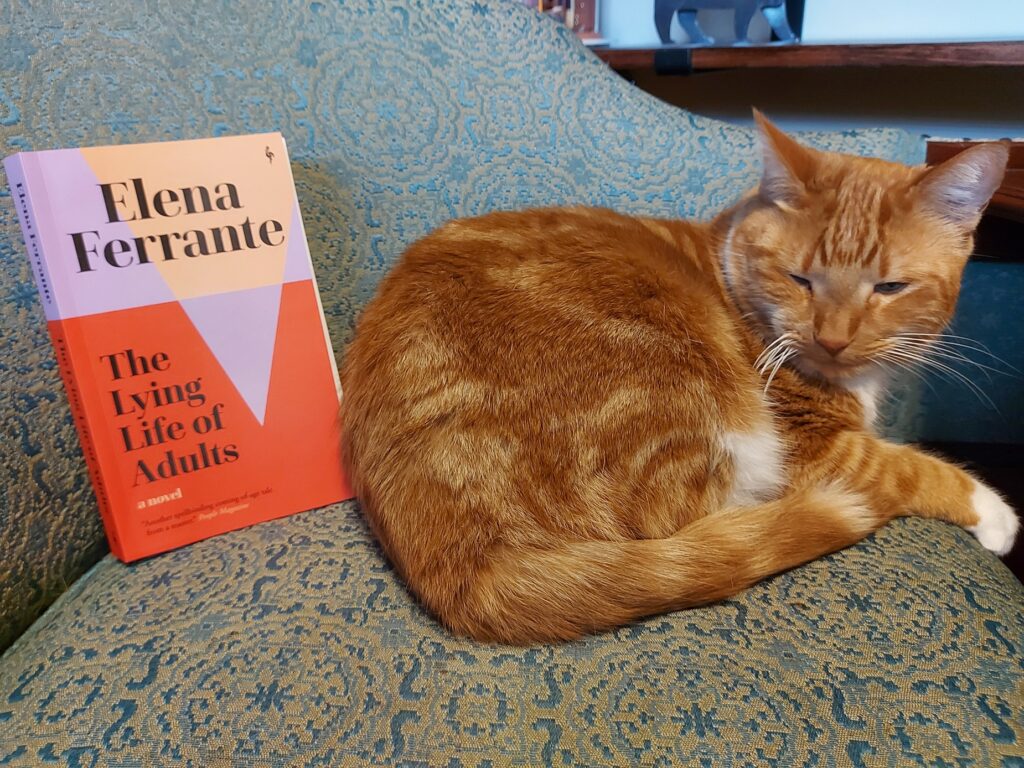The Lying Life of Adults by Elena Ferrante

The Lying Life of Adults is not a novel that I would have picked out myself, despite the glowing praise from reviewers covering the back cover and the inside cover. How did I come to read it then? One of the categories for the 2021 Indigo Reading Challenge is “A book recommended by Indigo experts” and this is the book recommended to me by an Indigo expert. The Lying Life of Adults is written by Italian novelist Elena Ferrante and is set in Naples. It is a coming-of-age story about a teenage girl named Giovanna. I cannot say that I enjoyed reading this novel.
The novel opens on twelve-year-old Giovanna overhearing her father tell her mother that he thinks Giovanna is very ugly. What he actually said was, “She is getting the face of Vittoria”, which Giovanna equates with ugliness because until that point all she knew about her Aunt Vittoria is that her father is estranged from his sister and that Aunt Vittoria is a “monstrous” person. This statement from her father is made a time when Giovanna is starting to go through puberty and not feeling comfortable in her own body, as well as when Giovanna is starting to not do well in school, which disappoints her parents.
Giovanna becomes desperate to meet her Aunt Vittoria to find out if she really is becoming ugly like Aunt Vittoria, and when she does, she is at first enamoured by her. I find it very difficult to see why anyone would be enamoured with Aunt Vittoria. She is a mean, miserable bitch who likes to control everyone around her. One minute she loves Giovanna, the next minute she is berating her. Aunt Vittoria’s story is that Giovanna’s father came between her and the great love of her life, who happened to be a married man with three kids, by telling the lover’s wife that her husband is having an affair with Vittoria. Vittoria’s lover soon died after that, and she has spent the last fifteen or so years mourning him. She also forced herself into the lives of her lover’s wife and children and controls everything they do, to the point that they both fear and loathe her. Not a great role model for a teenage girl.
Giovanna’s developing relationship with her Aunt Vittoria leads to the discovery that Giovanna’s father has been having an affair for years with the mother of Giovanna’s best friends, and Giovanna’s parents end up divorcing. Adults do not come across well in this novel, hence the title. Giovanna’s father is a pedant, and Giovanna’s mother becomes obsessive with her ex-husband. Neither of Giovanna’s parents seem to know how to parent very well. They are upset when she fails school, but neither does anything to help her when she clearly could have benefited from some counselling.
I empathize with Giovanna, but she is not very likeable and not someone I would have wanted to be friends when I was her age. She really does seem like she is becoming her Aunt Vittoria and ingratiates herself with the girlfriend of a young man that she falls madly in love with, with the intention of getting him to have sex with her. Giovanna’s behaviour is tied to her looks; when she is at her worst, she thinks she is ugly and is sure that other people think she is ugly. But when she is pretending to be a good person or when she actually is being a good person, people seem to be constantly telling her that she is beautiful.
The thing I found distracting about The Lying Life of Adults is the formal language. This may be because of the translation from the original Italian, but it reads like Giovanna is narrating her story from some future point of her life. If that is the case, she lacks complete self-awareness of her own actions, and she does not seem to realize that she acts like a brat sometimes. This novel is about her right of passage into adulthood, but she has a narrow view of what makes one an adult. She gives up masturbation and kissing and fondling with best friend Angela because she thinks she must have penetrative sex with a male to become an adult. This may have to do with the time in which the novel is set, the 1990s, the same time I grew up in, but when I was that age, I was not thinking I needed to have sex to become an adult. Being an adult meant moving out of your parents’ house and taking care of yourself (and yes I get the irony that today a lot of adults need to still live at home with their parents because housing is unaffordable).
It would have been interesting if this novel had carried on past Giovanna’s sixteenth birthday to when she actually is an adult to see if she really has learned anything from her experiences with Aunt Vittoria, but instead it ends rather abruptly.